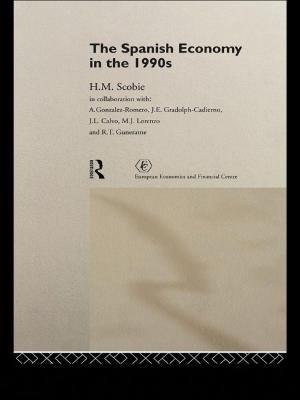Palestinian Civil Society
Foreign donors and the power to promote and exclude
Nonfiction, Social & Cultural Studies, Political Science, Government, Public Affairs & Administration, Social Science| Author: | Benoit Challand | ISBN: | 9781134020331 |
| Publisher: | Taylor and Francis | Publication: | December 2, 2008 |
| Imprint: | Routledge | Language: | English |
| Author: | Benoit Challand |
| ISBN: | 9781134020331 |
| Publisher: | Taylor and Francis |
| Publication: | December 2, 2008 |
| Imprint: | Routledge |
| Language: | English |
Palestinian Civil Society examines the development of civil society in the Arab Middle East and the impact of western donors, with particular reference to the Palestinian case. Looking at the evolution of Palestinian civil society organizations from sociological, historical, legal, and institutional perspectives, the book sheds light on the involvement of donors in Palestine, and the effect that aid has had on Palestinian civil society at a social, political and ideological level.
Drawing on Arabic texts, political theory and a detailed survey of donors and local organizations, this book challenges culturalist views that there cannot be a ‘vibrant civil society’ in the Arab world and examines the issues of depoliticization of civil society, the rise of the Islamist sector, and the gradual defeat of the left in the Occupied Territories. The author looks at how the interaction between donors and NGOs is not only centred on a western model of civil society, but also evolves around institutional mechanisms and disciplinary discourses, affecting the ability of local NGOs to adapt to the institutional requirements set by international donors.
Accessible to non-specialists, this book will be of interest to students and scholars of sociology, Middle Eastern studies and development studies.
Palestinian Civil Society examines the development of civil society in the Arab Middle East and the impact of western donors, with particular reference to the Palestinian case. Looking at the evolution of Palestinian civil society organizations from sociological, historical, legal, and institutional perspectives, the book sheds light on the involvement of donors in Palestine, and the effect that aid has had on Palestinian civil society at a social, political and ideological level.
Drawing on Arabic texts, political theory and a detailed survey of donors and local organizations, this book challenges culturalist views that there cannot be a ‘vibrant civil society’ in the Arab world and examines the issues of depoliticization of civil society, the rise of the Islamist sector, and the gradual defeat of the left in the Occupied Territories. The author looks at how the interaction between donors and NGOs is not only centred on a western model of civil society, but also evolves around institutional mechanisms and disciplinary discourses, affecting the ability of local NGOs to adapt to the institutional requirements set by international donors.
Accessible to non-specialists, this book will be of interest to students and scholars of sociology, Middle Eastern studies and development studies.















